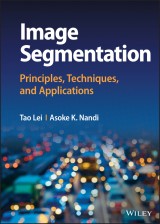Details

Image Segmentation
Principles, Techniques, and Applications1. Aufl.
|
111,99 € |
|
| Verlag: | Wiley |
| Format: | EPUB |
| Veröffentl.: | 26.09.2022 |
| ISBN/EAN: | 9781119859031 |
| Sprache: | englisch |
| Anzahl Seiten: | 336 |
DRM-geschütztes eBook, Sie benötigen z.B. Adobe Digital Editions und eine Adobe ID zum Lesen.
Beschreibungen
<b>Image Segmentation</b> <p><b>Summarizes and improves new theory, methods, and applications of current image segmentation approaches, written by leaders in the field </b> <p>The process of image segmentation divides an image into different regions based on the characteristics of pixels, resulting in a simplified image that can be more efficiently analyzed. Image segmentation has wide applications in numerous fields ranging from industry detection and bio-medicine to intelligent transportation and architecture. <p><i>Image Segmentation: Principles, Techniques, and Applications</i> is an up-to-date collection of recent techniques and methods devoted to the field of computer vision. Covering fundamental concepts, new theories and approaches, and a variety of practical applications including medical imaging, remote sensing, fuzzy clustering, and watershed transform. In-depth chapters present innovative methods developed by the authors—such as convolutional neural networks, graph convolutional networks, deformable convolution, and model compression—to assist graduate students and researchers apply and improve image segmentation in their work. <ul><li>Describes basic principles of image segmentation and related mathematical methods such as clustering, neural networks, and mathematical morphology.</li> <li>Introduces new methods for achieving rapid and accurate image segmentation based on classic image processing and machine learning theory.</li> <li>Presents techniques for improved convolutional neural networks for scene segmentation, object recognition, and change detection, etc.</li> <li>Highlights the effect of image segmentation in various application scenarios such as traffic image analysis, medical image analysis, remote sensing applications, and material analysis, etc.</li></ul> <p><i>Image Segmentation: Principles, Techniques, and Applications</i> is an essential resource for undergraduate and graduate courses such as image and video processing, computer vision, and digital signal processing, as well as researchers working in computer vision and image analysis looking to improve their techniques and methods.
<p>Preface</p> <p>About the Authors</p> <p>List of Abbreviations</p> <p><b>Part One: Principle </b></p> <p>1 Introduction to Image Segmentation</p> <p>2 Principles of Clustering</p> <p>3 Principles of Mathematical Morphology</p> <p>4 Principles of Neural Network</p> <p><b>Part Two: Methods</b></p> <p>5 Fast and Robust Image Segmentation Using Clustering</p> <p>6 Fast Image Segmentation Using Watershed Transform</p> <p>7 Superpixel-based Fast Image Segmentation</p> <p><b>Part Three: Application</b></p> <p>8 Image Segmentation for Traffic Scene Analysis</p> <p>9 Image Segmentation for Medical Analysis</p> <p>10 Image Segmentation for Remote Sensing Analysis</p> <p>11 Image Segmentation for Material Analysis</p>
<p><b>Tao Lei,</b> Professor, School of Electronic Information and Artificial Intelligence, Shaanxi University of Science and Technology, China. His research interests include image processing, pattern recognition, and machine learning and he has authored and co-authored more than 100 research papers. </p> <p><b>Asoke K. Nandi,</b> Professor, Department of Electronic and Electrical Engineering, Brunel University London, UK. He is also Distinguished Visiting Professor, Xi’an Jiaotong University, China. Professor Nandi has authored over 600 technical publications, including 280 journal papers as well as five books.
<p><b>Summarizes and improves new theory, methods, and applications of current image segmentation approaches, written by leaders in the field </b></p> <p>The process of image segmentation divides an image into different regions based on the characteristics of pixels, resulting in a simplified image that can be more efficiently analyzed. Image segmentation has wide applications in numerous fields ranging from industry detection and bio-medicine to intelligent transportation and architecture. <p><i>Image Segmentation: Principles, Techniques, and Applications</i> is an up-to-date collection of recent techniques and methods devoted to the field of computer vision. Covering fundamental concepts, new theories and approaches, and a variety of practical applications including medical imaging, remote sensing, fuzzy clustering, and watershed transform. In-depth chapters present innovative methods developed by the authors—such as convolutional neural networks, graph convolutional networks, deformable convolution, and model compression—to assist graduate students and researchers apply and improve image segmentation in their work. <ul><li>Describes basic principles of image segmentation and related mathematical methods such as clustering, neural networks, and mathematical morphology.</li> <li>Introduces new methods for achieving rapid and accurate image segmentation based on classic image processing and machine learning theory.</li> <li>Presents techniques for improved convolutional neural networks for scene segmentation, object recognition, and change detection, etc.</li> <li>Highlights the effect of image segmentation in various application scenarios such as traffic image analysis, medical image analysis, remote sensing applications, and material analysis, etc.</li></ul> <p><i>Image Segmentation: Principles, Techniques, and Applications</i> is an essential resource for undergraduate and graduate courses such as image and video processing, computer vision, and digital signal processing, as well as researchers working in computer vision and image analysis looking to improve their techniques and methods.


















